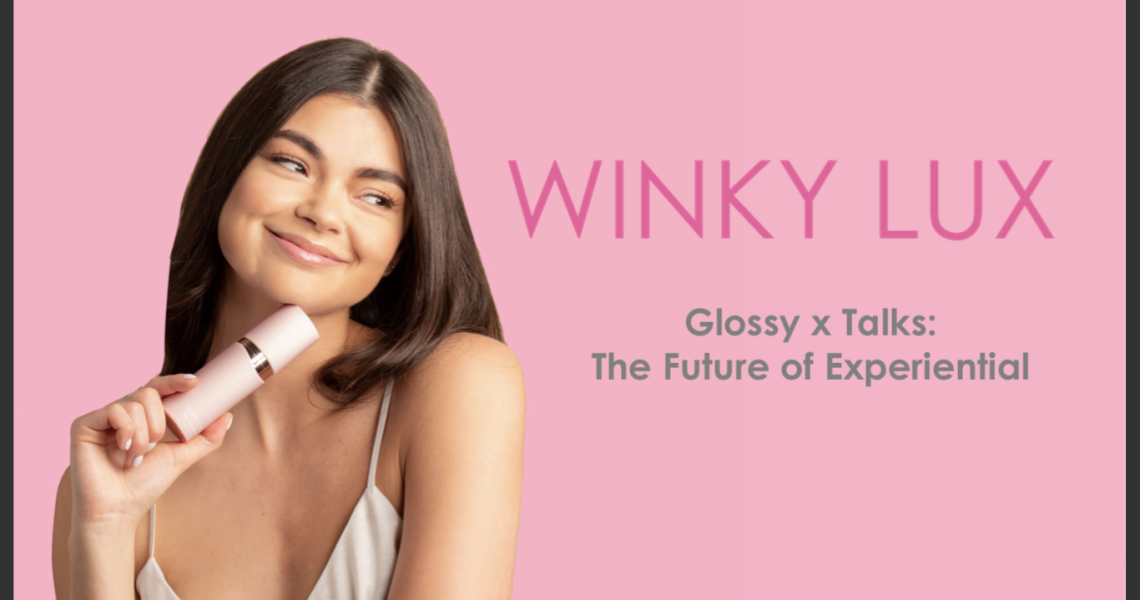The beauty industry is facing a tough challenge right now as “experiential” is all but dead.
Social distancing mandates have forced stores to close and as a result, brands are figuring out how to transition the consumer touchpoints they’ve created in-person to digital platforms. In the second edition of Glossy+ Talks, where leaders in the beauty and fashion industries discuss how they’re adapting their businesses to the new reality, Winky Lux co-founder and CEO Natalie Mackey discussed how her team has been ramping up the brand’s social strategy to be more reactive to what consumers want.
For a lot of digitally native DTC brands, like Winky Lux, this transition means going back to its roots, but as Mackey said, “brands can only grow so much before [they] need to be in front of the customer.” During this global intermission, that means finding ways to maintain that customer-brand relationships through social media and by staying true to your mission. “The most important thing is the brand purpose and how to keep that authentic.”
Adapting the purpose of experiential to digital
The purpose of experiential is mainly to give consumers a chance to not only engage with the products, but to also engage with the brand itself. Now that stores are closed, it is important to maintain those brand touchpoints on the platforms that the customers are currently on.
-It is important to recognize what your customers want from you and expect from your brand. Reminding them of the heaviness of the pandemic might not make sense with your brand’s mission and taking a light hearted approach that offers an escape may be a better option.
-Winky Lux did this by shifting one of its planned TikTok campaigns from a focus on beauty tutorials to featuring one of its fun glitter products that had a visually pleasing effect. The company also incorporated videos from its manufacturing plants showing products being made, which had a relaxing ASMR effect.
-Engaging in direct messages with customers is also a positive way to provide the same customer service that they would normally receive in store. For example, offer your DMs as a place for customers to get advice about which products or colors suit them best and train your customer service reps the same way you would train your store associates.
Ad position: web_incontent_pos1
Your brand can make positive contributions that still feel like they fall within the brand mission.
Aside from providing escapes for customers, brands have the ability to do some socially positive initiatives that still feel on-brand and that customers will appreciate.
-Finding a cause to support during the pandemic that aligns with previous charitable initiatives that your company participated in and offering donation matched to that will show your audience that by supporting the brand, they will continue to support the causes that are important to the community you’ve built.
-From a manufacturing standpoint, your partners might be able to produce products that are in high demand right now, like face masks and hand sanitizer. Winky Lux delayed the production of one of its new products in order to produce hand sanitizer that still incorporated the packaging and aesthetic that the brand is known for.
-Sending these needed products to customers in the form of free gifts with purchase or promising a portion of the items will be donated will show your customer that by supporting you, they are supporting society at large.
Ad position: web_incontent_pos2
The beauty industry’s post-coronavirus experiential will have to adapt to the new reality.
Mackey said industry leaders in China have expressed that in the Chinese market, which is a couple months ahead of the U.S.,spending patterns were approximately 70% of what they were prior to the pandemic.
-Consumers were also less likely to travel or to go to places with major crowds so smaller stores and experiential touch points will likely be better for engaging customers.
-“We won’t bring back testers in stores,” Mackey said. Rather, her team is in the process of manufacturing micro samples of its products that are good for two to three uses, versus a deluxe sample that has a week’s worth of product. This is a costly measure for individual retail stores, but chains like Ulta and Sephora might have an even harder time making that transition.
-In order to secure product reviews of new products, which Mackey mentioned are crucial for new products, brands might have to partner more with subscription boxes like FabFitFun or Ipsy in order to get samples into consumer’s hands.
Event video
See the slides


Know your brand mission and stay true to it.

Find the core of how your customers like to engage with you and extract that.

Winky Lux is a brand that is known for its sharable, visually captivating aesthetic.

Realize how your brand can best support your customer. It might be by offering them an escape.

Let your team have some fun and give the brand a personality.





